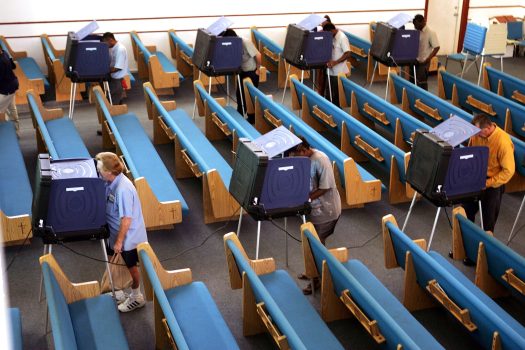
On Election Day, voters across the country will head to their designated polling location to cast their ballot. For millions, this means entering a house of worship: Nearly one of every five polling locations nationwide is a church.
Many people of diverse beliefs feel uncomfortable voting in a house of worship. For some, entering a house of worship for any purpose violates their religious or non-religious convictions. And houses of worship have been known to abuse their positions, using elections as a chance to proselytize their faith, shape voters’ opinions on key issues (such as abortion), or even endorse specific candidates. Unsurprisingly, studies have shown that where people vote influences how they vote – and that people who vote in houses of worship are more likely to support conservative positions and candidates.
Forcing voters to enter a house of worship to exercise their civic rights seems, on an intuitive level, to violate the constitutional separation of church and state. Yet the few courts that have considered this question, including federal appeals courts in the Tenth and Second Circuits, have held that houses of worship can permissibly serve as polling locations. And under recent Supreme Court jurisprudence, which focuses primarily on history and tradition, courts may be less likely than ever to ban the longstanding practice of using churches as polling locations.
Fortunately, voters have other tools at their disposal to vote in a comfortable and secular manner. If the polling location in your precinct is a house of worship, you can:
Some states allow elections to be conducted wholly or partly by mail. As with absentee voting, the rules vary considerably state-by-state, so be sure to familiarize yourself with your state’s requirements.
Just because courts accept the practice of using houses of worship as polling locations does not mean you have to. Contact your state or local election office to demand that no voter in your district is forced to enter a house of worship to exercise their right to vote and to suggest alternative secular locations.
Alexandra Zaretsky is litigation counsel at Americans United.